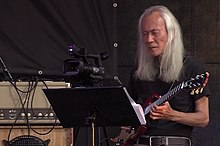Ryō Kawasaki
Ryō Kawasaki ( Japanese 川 崎 燎 , Kawasaki Ryō ; * February 25, 1947 in Tokyo ; † April 13, 2020 in Tallinn ) was a Japanese jazz guitarist and composer who contributed significantly to the development of the guitar synthesizer .
Career
Kawasaki first learned the violin as a child; at the age of 14 he devoted himself to the guitar. Two years later he led his first band, but also built organs. He graduated from Nihon University with a degree in quantum physics . After completing his training, he was employed as a sound engineer for the Japanese label Victor Records . In 1969 he recorded his first album, Easy Listening Jazz Guitar , for Polydor . Although it attracted interest and he received third place in a Japanese magazine's jazz poll in 1970, he worked primarily as a studio musician and recorded a wide variety of things, from pop and rock singles to radio and television commercials. In 1972 he presented a jazz rock album called Guts the Guitar .
Kawasaki moved to New York City in 1973. He appeared as guitarist for Joe Lee Wilson at the Newport Jazz Festival and played in the band of Bobbi Humphrey . In addition to his work in Gil Evans' band (as guitarist on the album The Gil Evans Orchestra Plays the Music of Jimi Hendrix and 1975 on There Comes a Time ) he toured North America with Chico Hamilton and played with Elvin Jones (with whom he also and later toured Europe with Joanne Brackeen ). In the mid-1970s, other albums were created under his own name, such as Eight Mile Road , Juice or Prism . In MPS appeared with tape to the Dave Liebman belonged, in 1978 the album Nature's Revenge . In addition, he built the first guitar synthesizers in collaboration with Korg and Roland Corporation and created his synthesizer program of the same name for the Commodore 64 .
As a technology and computer lover, Kawasaki withdrew from the music business in the 1980s to devote himself to programming, until after founding his own record company Satellites Records in the early 1990s he intervened again in the music scene. Different publications appeared in loose succession. In his new homeland, Estonia, where he lived for almost 20 years, he recorded the studio album Reval (2001) and the live album Tribute to Keith Jarrett (2010) with local musicians . In 2016 Kawasaki founded (again with Estonian musicians) the band Ryo Kawasaki & Level 8 , which also toured Japan and released the album Level 8 (2017).
Kawasaki was characterized by an individual guitar style, characterized by a hard attack, but very fluid and creative in expression. His computer and programming knowledge helped him to constantly improve the sound on the guitar (development of his own guitar synthesizer as early as 1979). But he also played the acoustic guitar, for example on the solo album Here, There and Everywhere .
Kawasaki mentioned guitarists as diverse as Wes Montgomery , George Benson , Carlos Santana , Andrés Segovia and Django Reinhardt as influences . Taking these different styles into account, he developed his own sound, not being closed to technical developments, but rather being extremely open to them. He has written more than 300 compositions. His music can be heard on more than 30 albums; he also composed the jazz ballet Still Point , which was performed at the Estonia National Opera in 2001/2002 , and wrote film music.
Kawasaki died in Estonia on Easter Monday 2020 at the age of 73.
Discography (selection)
- 1979: Mirror of My Mind
- 1983: Lucky Lady
- 1987: Images
- 1993: My Reverie
- 1994: Love Within the Universe
- 2012: Plays Solo Guitar: Spain
Web links
- Web presence
- Ryō Kawasaki at Allmusic (English)
- Ryō Kawasaki at Discogs (English)
Individual evidence
- ↑ a b c Obituary for Ryō Kawasaki (Estonian)
- ↑ a b Ryo Kawasaki, Jazz Fusion Guitarist and Guitar Synth Inventor, Dies at 73 (Billboard)
- ↑ Ryō Kawasaki in the Internet Movie Database (English)
| personal data | |
|---|---|
| SURNAME | Kawasaki, ryo |
| ALTERNATIVE NAMES | 川 崎 燎 (Japanese) |
| BRIEF DESCRIPTION | Japanese jazz guitarist and composer |
| DATE OF BIRTH | February 25, 1947 |
| PLACE OF BIRTH | Tokyo |
| DATE OF DEATH | April 13, 2020 |
| Place of death | Tallinn |
